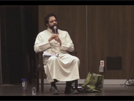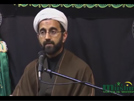Verse36
- Details
- Hits: 2268
(36) وَاعْبُدُواْ اللّهَ وَلاَ تُشْرِكُواْ بِهِ شَيْئًا وَبِالْوَالِدَيْنِ إِحْسَانًا وَبِذِي الْقُرْبَى وَالْيَتَامَى
وَالْمَسَاكِينِ وَالْجَارِ ذِي الْقُرْبَى وَالْجَارِ الْجُنُبِ وَالصَّاحِبِ بِالجَنبِ وَابْنِ السَّبِيلِ وَمَا مَلَكَتْ
أَيْمَانُكُمْ إِنَّ ا للّهَ لاَ يُحِبُّ مَن كَانَ مُخْتَالاً فَخُورًا
36. " And worship Allah and do not associate anything with Him, and do good to the parents, and to the kindred, and the orphans and the needy, and the neighbour close to you, and the neighbour who is a stranger, and the companion in a journey, and the way farer, and (the slaves) whom your right hands possess. Verily Allah does not love the one who is proud, boastful."
Commentary:
In this verse, some different rights are spoken about. They are irrespective of the rights of Allah, and the rights of people, and also some civilities of social life. On the whole, there are ten commandments mentioned in the verse.
1- The first theme therein is that it invites people to worship and servitude to Allah while they should abandon idolatry and infidelity. This godly manner is the root of all Islamic agenda. The act of following the notion of Unity and theism, purifies the soul, clarifies the intention, strengthens the will, and tightens the decision for performing any right and useful action in the cause of Allah. Since the verse is to state a series of Islamic rights, before referring to anything else, it points to the right of Allah upon people.
" And worship Allah and do not associate anything with Him, ..."
2- Then, it adds:
"...and do good to the parents, ..."
The right of parents is one of the subjects which has been repeatedly emphasized in the holy Qur'an. There is fewer matters that have been recommended so much in it. In four occurrences of the Qur'an this idea has been mentioned after the subject of Unity.
3- Next to that, it continues saying:
"... and to the kindred, ..."
This subject is also one of the themes that has been emphasized abundantly in the Qur'an. It has sometimes been referred to as 'blood ties', and sometimes has been enjoined under the commandment of ' doing good to the kindred '.
4- Then it pays to the rights of orphans, and encourages the believing people to doing good unto the 'orphans'. The reason of this emphasis is that, as a result of different incidents, there always exist some orphan children in every society that forgetting them, not only spoils their condition but also puts the situation of the society in danger.
"... and the orphans,..."
5- Next to that, the Holy Qur'an reminds us the 'rights' of the needy ones.
"...and the needy, ..."
The reason of this remembrance is that: in every society there are usually some handicapped persons, some feeble ones, and the like of them that leaving them out is against all the principles of humanity.
6- After that, the verse recommends to doing good unto the neighbours who are near to us. It says:
"... and the neighbour close to you, ..."
7- The neighbours who are strangers to us are then recommended. It says:
"... and the neighbour who is a stranger, ..."
The 'right of neighbourhood ' is so important in Islam that Imam Amir-ul-Mu'mineen Ali (a.s.) has stated about it thus: " The Messenger of Allah (p.b.u.h.) instructed about them so much that we thought he might enjoin that they would inherit from each other." (1)
Another tradition denotes that one day it happened that the holy Prophet (p.b.u.h.) three times said: " By Allah, he does not believe."
A person asked him (p.b.u.h.) whom he meant, and the Prophet (p.b.u.h.) said: " The person whose neighbour is not in security from his molestation." (2)
8- After that, the Qur'an has recommended about those who are friends and companions. It says:
" ...and the companion in a journey, ..."
The Arabic phrase: /as-sahib-il-janb/, of course, has a larger scope of meaning than 'friend' and 'companion'. Thus, the verse conveys a general and inclusive command regarding to having good manner due to those who somehow connect with us irrespective of real friends, fellow-workmen, fellow-travellers, those who ask us for something, students, counsellors, and waiters.
9- Another group, whom are recommended about here, are those who will be in need, because of some reasons, when they are in journey and are far from their own home, although they may be rich in their own city. So, it says:
"... and way farer, ..."
10- The final recommendation is about doing good unto the slaves. It says:
"...and (the slaves) whom your right hands possess. ..."
In fact, the above verse begins with the subject of the right of Allah and concludes with ' the rights of slaves '. Not only in this verse the slaves are recommended about, but also many other verses of the Qur'an are upon this matter. At the end, the verse warns us, saying:
"...Verily Allah does not love the one who is proud, boastful."
(1) 'Amali, by Sadugh, p. 4208 (Persian translation) & Tafsir-ul-'Amthal, vol. 3, p. 204.
(2) Ibid











